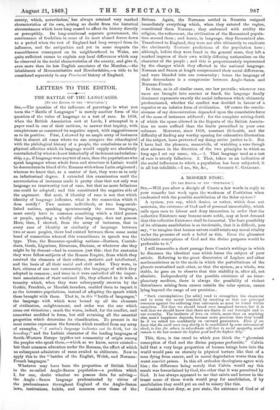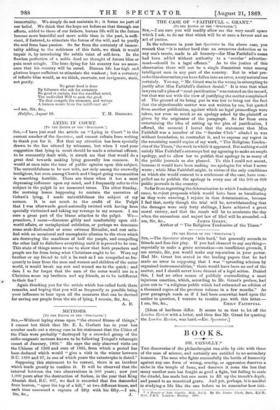A MODERN STOIC.
[TO THE EDITOR OF THE "SPECTATOR."] Sin,—Will you allow a disciple of Comte a few words in reply to your remarks last week upon the weakness of Positivism when confronted with the possible annihilation of the Solar system?
A system, you say, which denies, or rather, which does not maintain, the existence of God and of personal immortality, which calls upon men to labour and deny themselves in order that the collective Existence may become more noble, may at least demand that this collective Existence shall be immortal. The bare possibility of its ultimate annihilation is so intolerable, that it is difficult, you say, " to imagine that human nature could retain any moral vitality under the pressure of such a belief as this. Even the gloomiest Calvinistic conceptions of God and the divine purposes would be preferable to it."
I will transcribe a short passage from Comte's writings in which he discusses the identical case which forms the subject of your article. Referring to the great discoveries of Laplace and other mathematicians as to the mode in which the perturbations of the planets neutralized each other, so that the system, as a whole, was stable, he goes on to observe that this stability is, after all, not absolute. Independently of the possible existence of an inter- planetary medium, there is always the possibility of violent disturbance arising front causes outside the solar system, causes lying beyond the range of our prevision .
"Such contemplations [he adds] tend to strengthen the character and to raise the moral standard, by teaching us that our principal resource against the suffering that surrounds us must be found within ourselves. Not that we should brood over imagined terrors, but it is well that we should know that there are limits to our foresight and to our security. The instincts of love, on which, more than on anything else, man's happiness depends, become more precious than they would be if we relied too confidently on outward guarantees. Even if we knew that the earth were very shortly to be annihilated by some astronomical shock, to live for others, to subordinate self-love to social sympathy, would remain to the last moment the highest good and the highest duty."
This, then, is the creed to which you think the " gloomiest conception of God and the divine purposes preferable." Calvin
held that a very large proportion of human beings born into the world would pass an eternity in physical torture like that of a man dying from cancer, and in moral degradation worse than the worst convict prison. In this all orthodox theologians agree with him ; the difference being merely that Calvin would say this result was foreordained by God, the other that it was permitted by God. It has always appeared to me that saints and heroes in the
tritest sense of those words would pray for annihilation, if by annihilation they could put an end to misery like this.
Comtists do not deny, as you state, the existence of God or of
immortality. We simply do not maintain it ; it forms no part of our belief. We think that the hope set before us that through our efforts, added to those of our fathers, human life will in the future become more beautiful and more noble than in the past, is suffi- cient, if fostered, to stimulate the forces of the will, and to purify the soul from base passion. So far from the certainty of immor- tality adding to the nobleness of this faith, we think it would impair it, by introducing the subtle taint of self-love. In the flawless perfection of a noble deed no thought of future bliss or pain must mingle. The hero dying for his country has no assur- ance that his country will be saved. Human life has high and glorious hopes sufficient to stimulate the weakest ; but a certainty of infinite bliss would, as we think, enervate, not invigorate, stain, not purify.
No great deed is done By falterers who ask for certainty.
No good is certain, but the steadfast mind, The undivided Will to seek the good. 'Tis that compels the elements, and wrings A human music from the indifferent air."
—1 am, Sir, &c.,































 Previous page
Previous page